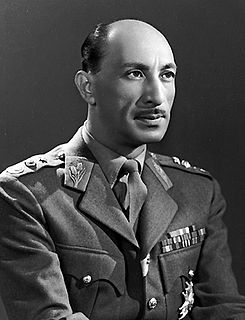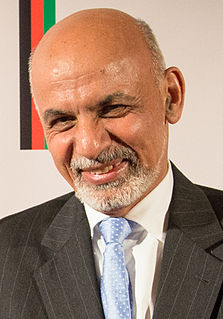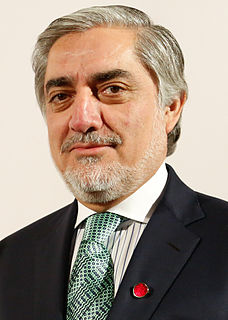
In the Pashtunwali, a code of laws of the Pashtun peoples living in areas of Afghanistan and Pakistan and neighboring countries, loya jirga is a special type of jirga that is mainly organized for choosing a new head of state in case of sudden death, adopting a new constitution, or to settle national or regional issue such as war. It predates modern-day written or fixed laws and is mostly favored by the Pashtun people but to a lesser extent by other nearby groups that have been influenced by Pashtuns.

Mohammed Zahir Shah was the last King of Afghanistan, reigning from 8 November 1933 until he was deposed on 17 July 1973. He expanded Afghanistan's diplotmatic relations with many countries, including with both Cold War sides. In the 1950s, Zahir Shah began modernizing the country in line with Turkey. His long reign was marked by peace and stability that was lost afterwards.

The politics of Afghanistan consists of the council of ministers, provincial governors and the national assembly, with a president serving as the head of state and commander-in-chief of the Afghan Armed Forces. The nation is currently led by President Ashraf Ghani who is backed by two vice presidents, Abdul Rashid Dostum and Sarwar Danish. In the last decade the politics of Afghanistan have been influenced by NATO countries, particularly the United States, in an effort to stabilise and democratise the country. In 2004, the nation's new constitution was adopted and an executive president was elected. The following year a general election to choose parliamentarians took place.

Hamid Karzai is an Afghan politician who was the President of Afghanistan from 22 December 2001 to 29 September 2014, originally as an interim leader and then as President for almost ten years, from 7 December 2004 to 2014. He comes from a politically active family; Karzai's father, uncle and grandfather were all active in Afghan politics and government. Karzai and his father before him, Abdul Ahad Karzai, were each head of the Popalzai tribe of the Durrani tribal confederation.

Gul Agha Sherzai, also known as Mohammad Shafiq, is a politician in Afghanistan. He is the former governor of Nangarhar province in eastern Afghanistan. He previously served as Governor of Kandahar province, in the early 1990s and from 2001 until 2003. As of October 2013, Sherzai resigned from his post as governor and formally announced himself as a candidate for Afghanistan's 2014 Presidential Election. He is presently the minister of border and tribal affairs.

Mohammad Ashraf Ghanī Ahmadzai ; born 19 May 1949 as the son of Shah Jan in Logar, is an Afghan politician and current President of Afghanistan, elected on 21 September 2014. An anthropologist by education, he previously served as finance minister and the chancellor of Kabul University.

Kābul, situated in the east of the country, is one of the thirty-four provinces of Afghanistan. The capital of the province is Kabul city, which is also Afghanistan's capital. The population of the Kabul Province is nearly 4 million people as of 2012, of which almost 80 percent live in the urban areas. The current governor of the province is Hamid Akram.

This article gives information on elections in Afghanistan.

The House of Representatives of the People or Majles-e-Namayendagan Afghanistan in Persian and Wolesi Jirga in Pashtu and Turkic, is the lower house of the bicameral National Assembly of Afghanistan, alongside the upper House of Elders.

The House of Elders or Mesherano Jirga, is the upper house of the bicameral National Assembly of Afghanistan, alongside the lower House of the People. The House of Elders primarily has an advisory role rather than a maker of law. However, it does have some veto power.

Human rights in Afghanistan is a topic of some controversy and conflict. While the Taliban were well known for numerous human rights abuses, several human rights violations continue to take place in the post-Taliban government era. Afghanistan has an interesting strong human rights framework within its constitution.

Presidential elections were held in Afghanistan on 20 August 2009. The election resulted in victory for incumbent Hamid Karzai, who won 49.67% of the vote, while his main rival Abdullah Abdullah finished second with 30.59% of the vote.

Abdullah Abdullah is an Afghan politician, serving as Chief Executive of the Islamic Republic of Afghanistan since September 2014. From October 2001 to April 2005, he served as Minister of Foreign Affairs. Prior to that he was a senior member of the Northern Alliance working as an adviser to Ahmad Shah Massoud. He also worked as a medical doctor during the late 1990s.

The Afghan parliamentary election, 2010 to elect members of the House of the People took place on 18 September 2010. The Afghan Independent Election Commission - established in accordance with the article 156 of the Constitution of Afghanistan for the purpose of organizing and supervising all elections in the country - postponed the poll from its original date of 22 May to September 18.

This article covers the history of Afghanistan since the communist military coup on 27 April 1978, known as the Saur Revolution, when the People's Democratic Party of Afghanistan (PDPA) took power. Since that day, an almost continuous series of armed conflicts has dominated and afflicted Afghanistan.

United Nations Security Council resolution 1419, adopted unanimously on 26 June 2002, after reaffirming all resolutions on the situation in Afghanistan, particularly Resolution 1383 (2001) and resolutions 1368 (2001) and 1373 (2001) on terrorism, the Council commended the country for the successful conduct of an emergency loya jirga and called for co-operation from the Afghan people with the Transitional Administration.

United Nations Security Council resolution 1471, adopted unanimously on 28 March 2003, after reaffirming all resolutions on the situation in Afghanistan, the Council extended the mandate of the United Nations Assistance Mission in Afghanistan (UNAMA) for an additional period of twelve months until 28 March 2004.

Presidential elections were held in Afghanistan on 5 April 2014, with a second round held on 14 June. Incumbent President Hamid Karzai was not eligible to run due to term limits. The registration period for presidential nominations was open from 16 September 2013 until 6 October 2013. A total of 27 candidates were confirmed to be running for office. However, on 22 October Afghanistan’s Independent Election Commission disqualified 16 of the candidates, leaving only 11 in the race. By April 2014 three candidates gave up the race and decided to support some of the eight remaining candidates. Opinion polls showed Abdullah Abdullah and Ashraf Ghani as the front-runners and indeed the results of the first round election had Abdullah in the lead and Ghani behind him. The second set of results came after the run-off on 14 June, two months after the first round. Preliminary results were expected on 2 July and the final result on 22 July. However, widespread accusations of fraud delayed these results. In September 2014, the Independent Election Commission named Ashraf Ghani the winner.

Parliamentary elections were held in Afghanistan on Saturday 20 October 2018 to elect members of the House of the People. They had originally been scheduled for 15 October 2016, but were initially postponed to 7 July 2018, and then again to 20 October. Much of the prelude to the elections has focused on the debate over reforming the country's electoral laws. The current system is one of single non-transferable vote. Kandahar's election was held on October 27.
















